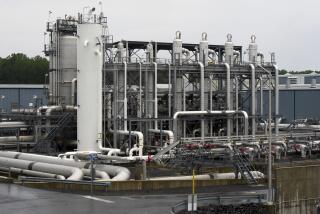With eye on midterms, Trump administration moves to boost ethanol use
The Trump administration announced Monday that it will press ahead with plans to promote the use of ethanol, a move that could shore up support for Republicans in the Midwest but also comes amid fierce opposition from independent oil refiners and a bipartisan group of lawmakers.
The move to direct the Environmental Protection Agency to draft a rule allowing year-round sales of E15, or fuel that is 15% ethanol by volume, is “directed at increasing the supply of biofuels and providing consumer choice,” a senior Trump administration official told reporters on a conference call.
President Trump, who previewed the move in April, is expected to formally announce the directive at a rally for Republican candidates in Council Bluffs, Iowa, on Tuesday, according to multiple reports. The first-in-the-nation caucus state is the country’s largest ethanol producer; it is also one of the states projected to be hardest hit by Trump’s trade wars with China and other countries.
The EPA will move forward with the formal rule-making process, the official said, although the precise timing remains uncertain.
Sales of E15 are prohibited during the summer months because of air pollution concerns. The Renewable Fuel Standard generally calls for sales to be limited to E10, meaning a blend in which predominantly corn-based ethanol comprises 10% of the fuel.
Among those pushing for the change has been the CEO of ethanol processor POET, one of at least three firms that have lobbied Vice President Mike Pence on the issue. During the 2016 campaign, Trump also tried to win the support of Iowa voters by backing a higher ethanol mandate.
The American Petroleum Institute and others argue that higher ethanol levels can harm engines. Last week, a bipartisan group of 20 senators penned a letter to Trump opposing such a change.
“We are concerned that doing so would do nothing to address the policies impacting refinery jobs, could hurt millions of consumers whose vehicles and equipment are not compatible with higher ethanol blended gasoline, and risk worsening air quality,” they wrote.
Scott Segal, a lawyer at Bracewell LLP who has represented refining interests in Washington for more than two decades, said that while the move has been long sought by the ethanol industry, E15 “certainly imposes costs on refiners.”
“The way the renewable fuels program is currently implemented -- with its potential for high costs for tradeable credits -- already places some merchant refiners in danger,” Segal said. “Hopefully, when the administration opens the regulatory framework of the renewable fuels program, it will also have the opportunity to address the problems created by these tradeable credits in an effective and durable fashion. Protecting industrial workers at refineries as well as consumers depends on it.”
Proponents argue that claims of potential damage to vehicle engines are exaggerated and that increased ethanol use will boost the economy in rural parts of the country.
The Washington Post’s Steven Mufson contributed to this report.
More to Read
Start your day right
Sign up for Essential California for news, features and recommendations from the L.A. Times and beyond in your inbox six days a week.
You may occasionally receive promotional content from the Los Angeles Times.






